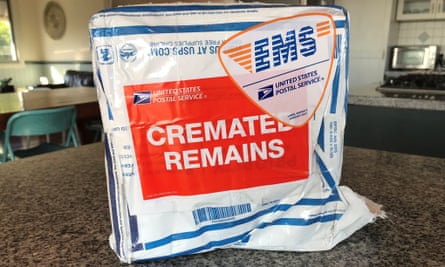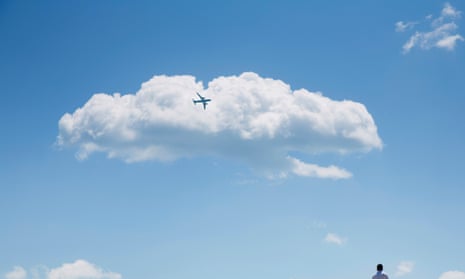My father’s first and only visit to Australia was via airmail. Covid-19 had ripped through his US nursing home like wildfire, annihilating everyone in its path.
I couldn’t fly home for my father’s death, so his ashes had to fly to me. I knew they were on their way; I just didn’t know when to expect them. Thanks to online shopping, I was well accustomed to the unpredictability of delivery during a pandemic.
The day my dad arrived in Brisbane, it was a sunny winter afternoon, still warm enough for a T-shirt. When the postman buzzed, I dashed down the stairs, geckos scattering along the fence beside me as I passed under the palm trees.
As the postman lifted a little package over the gate I held out my arms, expecting a new printer cartridge or a couple of books. I was shocked to spy a garish, tomato-coloured sticker: Cremated Remains. I gasped, and my mask stuck to my mouth.
As I watched the postman’s retreating back, I wondered at his lack of even cursory condolences. Had he somehow missed the sticker? Was he—like every other essential worker soldiering on through lockdown after lockdown—just too exhausted to bother?
After I caught my breath, I carried the package inside. It could have contained oatmeal cookies from my mother for the way the magpies continued singing.
I popped the package on the kitchen island and spent the rest of the day walking around it – stalking it, really. In retrospect, I was lucky to be home alone that day, my husband at work, my children at school. There was no pressure to clutch the package to my chest and sob, or confront its contents straightaway. I had time to process my feelings one by one.

I tentatively picked up the package like a child listening for the tell-tale rumble of Lego in a Christmas present. But the box inside was silent, save the crinkling of its plastic travel coat. I turned it over gently, reading all the labels, my brother’s handwriting, his customs declaration.
How do you declare a person? A third of him, to be exact, the other thirds divided between my stepmother and brother, though under “quantity” it simply said: 1. I choked up picturing my brother hunched over a counter in a post office on the other side of the world, trying to decide what to put for value. In the end, he’d gone with $0, because what number would have been enough? The postage: US$106.
I took photos. Lots of them. It was a way of slowing my emotions down further, of imbuing mundane things – plastic, cardboard, ceramic, ash – with the significance they deserved. I knew I’d want to revisit everything about that moment later, after I’d torn it apart.
Within the package was a box, brown and plain. I slit the lid and peeked inside like a parent surreptitiously checking whether a baby was asleep. More packaging cradled a bright blue urn. I didn’t take it out.
I have never taken it out.
My dad has been dead two years this May, and though I’ve had his ashes nearly as long, I haven’t looked at them yet. Nesting in its box, the urn is a matryoshka of mourning. I keep it tucked towards the back of my closet like a piece of antique lace, as if it could disintegrate in the elements. It was over a year before I recognised the irony in this, protecting ash from heat and light.
I’m not afraid of what I’ll find inside the urn; my father was more than a body to me. Still, it seems ill-fitting to scatter his remnants in a foreign city with a climate so unlike his own. Besides, I’ve lived in Brisbane scarcely three years; what if I move again?
My dad belongs in the places I remember from my childhood: an apple orchard; a rose garden by the sea; a marine park covered in snow. Bringing him home means packing up my box and flying it back – this time in an overhead compartment – full circle. Only now, when that circle closes, it will be with a sense of finality that I’m not ready to face.
While I keep my father’s ashes in the urn, unopened, unseen, there’s still one more step in our journey together. I’m not in denial – I know my dad is gone – but I want to prolong this last transition a little while yet, because this is the only kind of time I have left with my father now. And the space we hold for grieving is ours as long as we need it.
